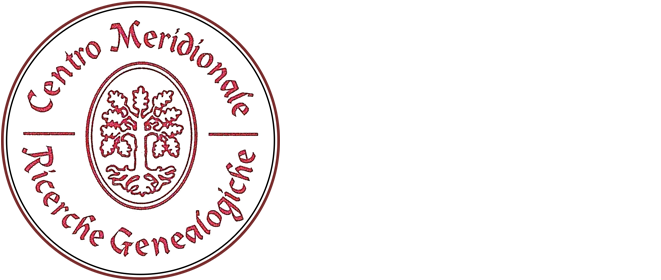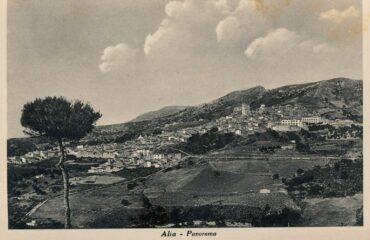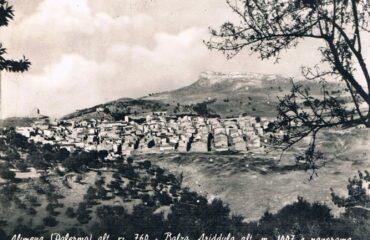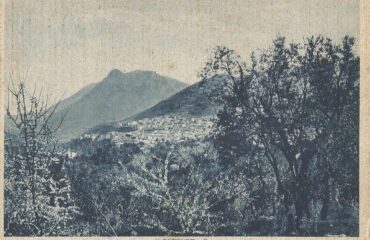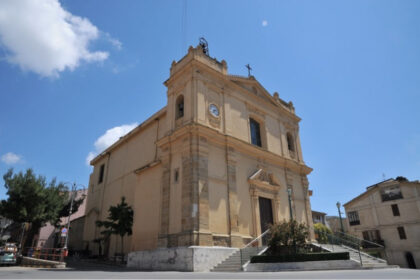
Historical notes on Aliminusa
Located at an altitude of 450 metres, in the valley of the Torto river, Aliminusa is a municipality of 1105 inhabitants, bordering the municipalities of Caccamo, Cerda, Montemaggiore Belsito, Sciara and Sclafani Bagni.
Although the toponym is documented as early as the 15th century, the foundation of the current town dates back to 1625. On 22 November 1625 Gregorio Bruno, owner of the feud of Aliminusa, obtained the licentia populandi and gave the new village the name of Sant’ Anna. The inhabitants of the new town mostly came from more ancient neighboring towns. As was customary, the Brunos and the Cutellis, their successors in 1652, equipped the nascent village with all the infrastructures necessary for the civil and religious life of the new inhabitants. The parish church was dedicated to Sant’Anna.
After the extinction of the Cutelli family in 1747, the town and the feud passed into ownership of the Paternò family and subsequently of the Recupero and Milone families.
Aliminusa had 709 inhabitants in 1798, 942 in 1831 and 1178 in 1861.
Sources for genealogy in Aliminusa: Civil Status records (births, marriages, deaths)
In 1819 Ferdinand I, King of the Two Sicilies, instituted the Civil State in Sicily on the model of the Napoleonic one already in force in the other regions of the kingdom, but the recordings began the following year. The civil registrars compiled the following registers in two originals: births, births of abandoned children, marriage banns, marriages, deaths and various documents. The annexes to the birth and marriage certificates were collected in separate files. With the royal decree of November 15, 1865, the new order was introduced which provided for the compilation of citizenship registers.
Consulting the civil status documents is usually the first phase of a genealogical research. If you want to start researching your family history in Aliminusa, contact us for more information!
Sources for genealogy in Aliminusa: parish records (baptisms, marriages, deaths, numbering of souls)
In its XXV session of 3-4 December 1563, the Council of Trent made it compulsory for all parish priests to compile special registers of baptisms, marriages and the dead. Beginning in 1614, a provision contained in the Rituale Romanum of Pope Paul V ordered parish priests to compile real and proper censuses of parishioners: the Status Animarum (States of Souls or Numbering of the Souls).
Certainly parish registers are an invaluable source for genealogical research, but they are not easy to read (they are written in Latin, with spellings and abbreviations that are difficult to understand for non-experts. Therefore, we advise you to rely on professionals for a fruitful research in parish registers.
Sources for genealogy in Aliminusa: the Riveli di beni ed anime
The Riveli di beni ed anime (Revelations of goods and souls) were censuses compiled by the individual municipal administrations. Numerous registers concern almost all the Sicilian municipalities and cover the period between the 16th and 18th centuries: the documents drawn up in the years 1548, 1569, 1584, 1593, 1607, 1616, 1623, 1636, 1651, 1682, 1714 and 1748 are preserved. They allow us to know not only the composition of individual families but also their socio-economic status and are therefore an irreplaceable source of research.
Alminusa’s Riveli are available for the year 1748.
Sources for genealogy in Aliminusa: notarial deeds
The notarial documentation kept in the State Archives and Notarial Archives is very useful for reconstructing a genealogy. Sometimes these are much older documents than ecclesiastical ones and therefore allow family history to be reconstructed even further back in time. In fact, some deeds, for example wills or dowry contracts, are rich in information of genealogical interest. Furthermore, even the consultation of notarial deeds allows us to know the socio-economic status of the family.
WHY RELY ON A PROFESSIONAL GENEALOGIST?
Reconstructing one’s family history is a fascinating adventure, a journey through time to discover places, facts and ancestors. From what you have read so far, you will have understood that it is very difficult to obtain valid results without the help and method of a professional genealogist who knows how to identify the sources necessary for research and correctly interpret ancient documents.
If your family also comes from Aliminusa and you want to entrust us with your genealogical research, contact us! Consultation and preliminary research are free!

 Italiano
Italiano 